The supermarkets, retail businesses and SMEs are always struggling with their chaotic checkouts and long-waiting lines and unhappy customers. Traditionally a supermarket or any other retail business has limited cash counters, however, during peak hours, long waiting lines are a common sighting at such businesses. The self-checkout machines are not new, in fact these solutions were invented in late 80s, but couldn’t get the traction. However, since past decade, businesses are proactively deploying these solutions to boost efficiency and to offer a better customer experience. The UAE is a very vibrant country having largest shopping malls and a huge retail industry. Supermarkets, shopping malls, and retail businesses located in Dubai, Sharjah, Abu Dhabi and other emirates of the country are well aware of tough competition and demanding customers in this market sector.
Therefore the integration of technology is common in retail industry. The self-service checkout kiosks, self-service payment kiosks and other interactive self-service kiosks are increasingly getting popular in the industry. The retail industry is investing heavily in self-service solution due to the fact that these solutions are excellent at delivering efficiency and convenience for both retailers and the consumers. The self-checkout machines are completely revolutionizing the way we shop.
Furthermore the cutting-edge technologies such as AI and other smart technologies are also making way to self-checkout kiosks, offering elevated customer experience and superior operational efficiency. In this blog we will discuss how self-checkout machines and self-service payment kiosks are revolutionizing supermarket and retail experience for both businesses and the customers.
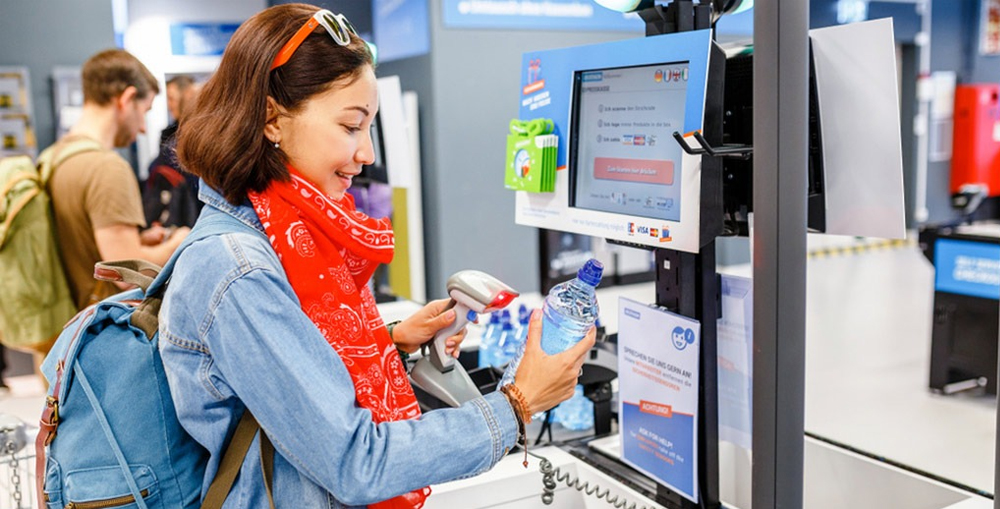
The Evolution of Supermarket Shopping: Self-Checkout Machines
What is a Retail Self-Checkout Kiosk Machine?
A retail self-checkout machine is a specialized interactive self-service kiosk. The retail self-checkout kiosk machine has additional hardware components which enable users to scan, bag and pay for the groceries or other retail items they have purchased from the supermarket.
A standard retail self-checkout kiosk machines consists of following hardware components:
- Interactive Screen: The self-checkout kiosk machines always have interactive touch screens. The touch screen serves as the primary user interface (UI) throughout the checkout process.
- Barcode Scanner: The barcode scanners and QR code scanners are essential component as these are used to scan the goods. Both in-built and external barcode scanners are used.
- Digital Weighing Scale: The digital weighing scales are also commonly used to price and tag the fruits, vegetables and other such stuff and lose items.
- RFID Readers: The RFID readers are the smart tag reader, which trigger alarms at the entrance if the item is not paid for. These are used to scan the items which are purchased.
- Payment Terminal: The payment terminal or POS is the credit/debit card machine, however, modern payment methods such as digital, mobile and contactless payments are also widely used.
- Cash Payments: Both cash acceptor and cash recyclers are widely used with retail self-checkout kiosk machines. The cash recycler is added to enable returning the change.
- CCTV Security Cameras: The retail self-checkout kiosk machines often comes with in-built CCTV security and surveillance cameras along with external CCTV cameras as well if needed.
See Also: What is a Self Service Kiosk? Here’s All You Need to Know
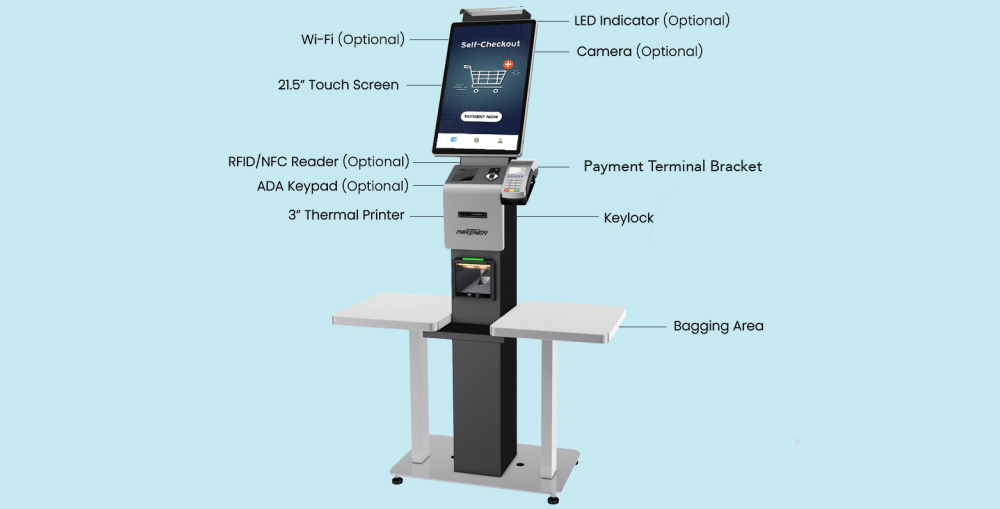
What is a Retail Self-Checkout Kiosk Machine?
Furthermore the interactive self-service kiosks comes with a software application that backs the entire operations. The retail self-checkout kiosk machines comes with a customized software application with following key features:
- Intuitive UIs: The intuitive UIs or user interfaces are designed specifically to facilitate the customer journey with multi-lingual support, on-screen prompts and various other information to enhance customer experience.
- Product Database: The retail self-checkout kiosk machines has in-built or integrated product database which is synchronized with the central information system to produce up-to-date information and products details to the customers.
- Inventory Management: Every supermarket, retail business or shopping center has an inventory management system, that system can be integrated with the retail self-checkout kiosk machine which enables it to track the quantity and update the inventory when a new purchase happens.
- Payment Processing: The retail self-checkout kiosk comes with secure payment features which enable allowing payment processing through the connected payment service provider. The in-built security features and fraud prevention protocols offer superior security to the customers.
- Third-party System Integration: The third-party system integration is a crucial component it links the retail self-checkout kiosk with accounts, inventory, loyalty program, and various other systems to support various functionalities at the kiosk.
The above listed are pretty much standard components of a retail self-checkout kiosk. Businesses can further customize it as per their unique business needs. Both the software and hardware is very flexible and offers unmatched customization which help businesses driving efficiency and it enables them to deliver excellent customer experience.
See Also: 3 Advantages of Kiosks in Retail Stores
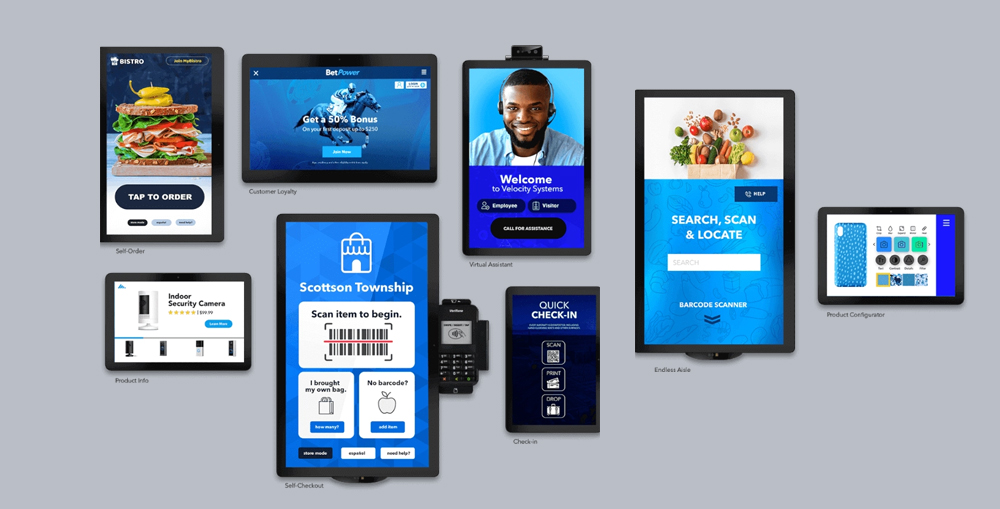
Both the software and hardware is very flexible and offers unmatched customization.
How Retail Self-Checkout Kiosk Machine Works?
The operation of a retail self-checkout kiosk machine is very simple and straightforward. The customers comes to the kiosk with their cart, then these scan and bag items, and make payment and that is it. However, there are several things going-on in the background.
Here is a simple workflow from customer’s point of view to help you understand how retail self-checkout kiosk machine works:
- Initiating the Self-Checkout: The customer approaches the retail self-checkout kiosk machine, they chose the language of their choice and then the on-screen instructions and prompts lead them to through the checkout process.
- Scanning Items: After initiating the checkout process, the customers are required to scan the items, the on-screen prompts and instructions are given to simplify the process. The customers can also weight the loose items and include them in their digital cart.
- Verifying the Cart: Once all items are scanned the full invoice is displayed on the screen with various other information and product details. If the customers want to modify their cart, they can do that at this stage and move on to the payment process.
Making the Payment: The payment is the final step, the customers can scan their loyalty cards, and they can apply discount vouchers. The customers can also split their payment in two or more available methods and make the payment to get the printed receipt.
See Also: What Is a Self-Service Payment Kiosk? Unveiling the Future of Transactions
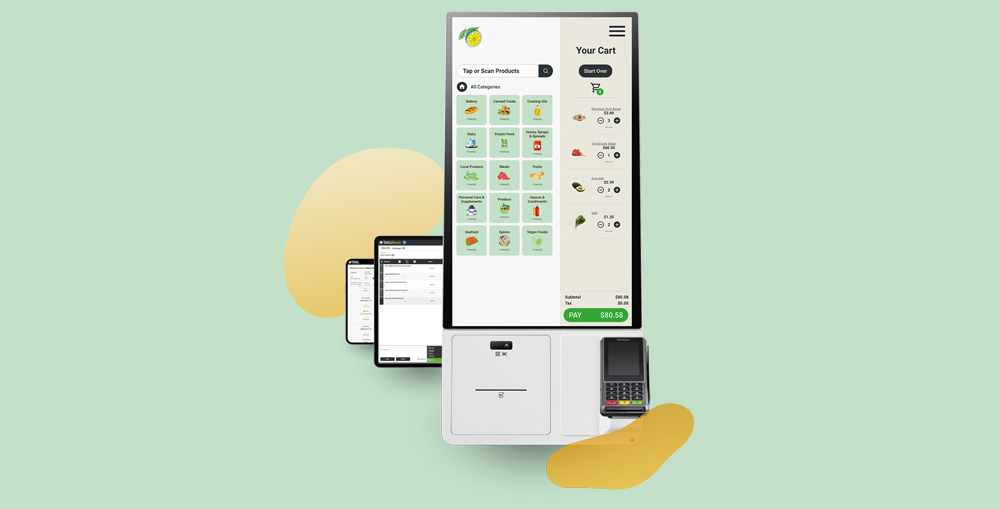
How Retail Self-Checkout Kiosk Machine Works?
For the customers the self-checkout process is made very simple, and quick. However, there is a lot going on behind the scene. Here are a few background processes which will help you understand the working of a retail self-checkout kiosk machine system:
- Initiating the Checkout: When a customer approaches the kiosk, it renders the UI as per the customer’s choice. It loads the information in the selected language and in case if any sign-in or scanning of loyalty card is required, it authenticates it too. Based on customer’s selection the personalized information, promotional offers, and other such options are loaded too.
- Scanning the Items: When the customer scans an item, the retail self-checkout kiosk machines decode the barcode, send it to the inventory management and product database and load all relevant information about that product. While creating digital cart in parallel. The product quantity is also updated and the relevant systems are updated accordingly.
- Verifying the Cart: While the customer verifies the cart, the kiosk loads relevant promotional content, information, and add-ons for upselling. If the customer made any change, all the relevant systems such as inventory management systems, accounts system, and all records are updated instantly, ensuring a smooth and seamless operation for all users.
- Making the Payment: When the customer chose to pay with their credit/debit card, the kiosk connects to the secure payment processor, it authenticates the payment and display success message on the screen. Similarly in case of cash, the currency notes are scanned for discrepancies through the on-board authenticator and then the payment is processed.
Furthermore there are various other intermediate workflows and processes which are essential to ensure a smoother and seamless operation. The primary POS and accounts management system along with inventory management and several other internal systems are all integrated with the retail self-checkout kiosk machine to enhance customer experience and to drive operational efficiency.
See Also: Self-Service Kiosks in Retail: Revolutionizing the Shopping Experience
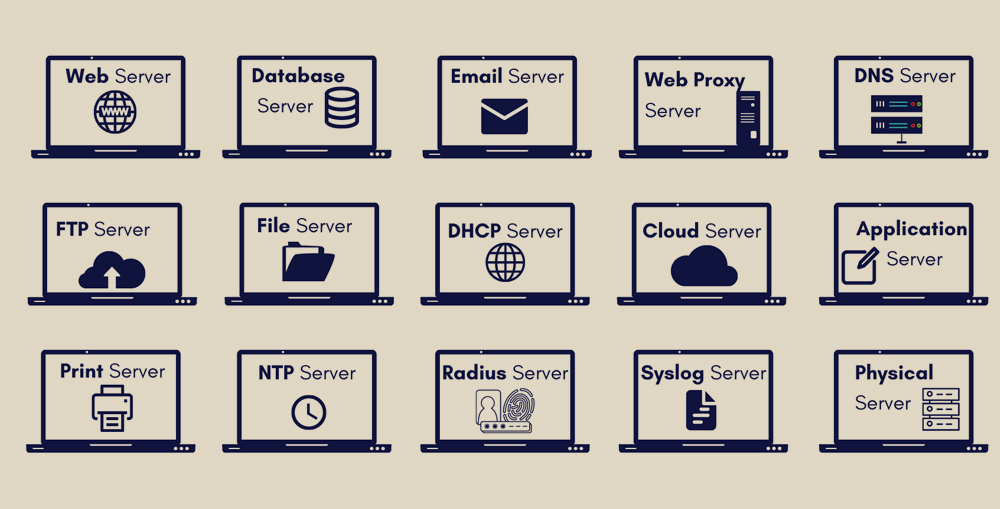
There are various intermediate workflows and processes which are essential to ensure a smoother and seamless operation.
Key Advantages of Retail Self-Checkout Kiosk Machine
The retail self-checkout kiosk machines offers several benefits for both customers and retailers. Whether deployed at a supermarket, a retail outlet, or a shopping mall, the retail self-checkout kiosk machines are known for their speedy service, satisfactory customer experience and better operational efficiency. Here are some key advantages of a retail self-checkout kiosk machine:
Key Advantages of Retail Self-Checkout Kiosk Machine for Customers
- Reduced Customer Wait Time: The customer wait time is crucial for a better customer experience. The retail self-checkout kiosk machines offer instant service, the checkout is quicker and simpler, and waiting lines are uncommon on kiosks. This help businesses effectively reducing the wait time. Furthermore the retail self-checkout provides alternate service channel which also reduce workload from traditional cash counters and help expediting the service delivery.
- Offer More Control and Freedom: The retail self-checkout kiosk machines offer superior customer experience by offering more control and freedom to customers. The customers can freely chose the items, they can review and modify their cart, and they can also chose the payment method of their choice. Furthermore the customers are catered personalized experience which itself is great at elevating customer experience.
- Intuitive User Interface: The retail self-checkout kiosks are very user-friendly machines, they offer customized customer experience. The user interfaces are designed for different audience groups. Moreover the customers can also freely chose the language of their choice which improve their interaction and help raising customer satisfaction. The customers can also compare different products and find in-depth details on the screen which help them making informed decision.
- Superior Privacy and Security: The retail self-checkout kiosk machines are digital solutions which eliminates the need of any staff intervention. The customers can effectively interact with the kiosk without sharing their purchase details, payment details or anything with the staff. Furthermore the customers can interact with secure payment gateways and POS machine which also offers additional security and help customer conduct the transactions privately.
- Higher Accessibility: Despite all those intuitive features the retail self-checkout kiosk machines are far superior in catering to the customers with special needs. Whether it is people with disabilities or any other special needs, the retail self-checkout kiosk is equipped with various accessibility features. The screens can be adjusted, the heights is also adjustable the kiosk also have specialized screens, and it can take voice command as well.
See Also: The Impact of Self-Service Kiosk on Customer Behavior
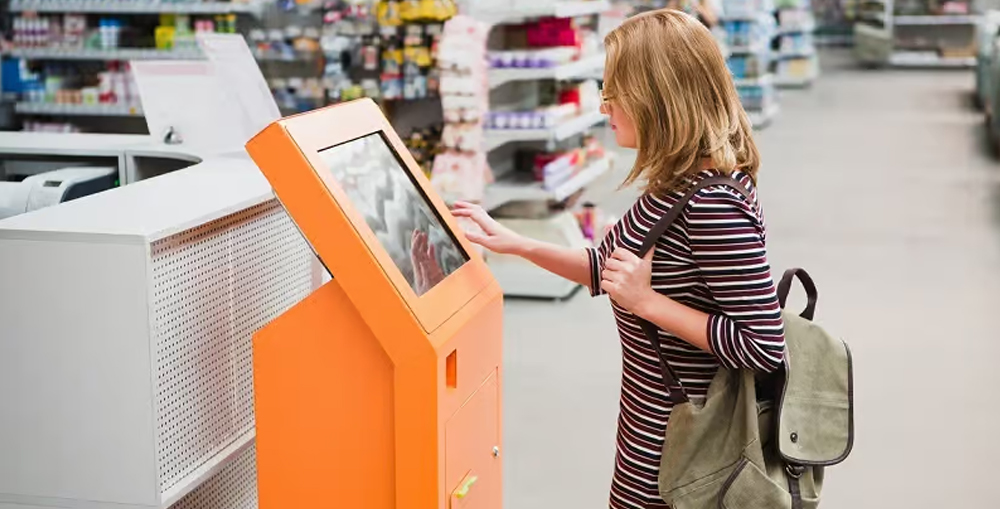
Key Advantages of Retail Self-Checkout Kiosk Machine for Customers
Key Advantages of Retail Self-Checkout Kiosk Machine for Businesses
- Optimized Human Resource Cost: The intuitive retail self-checkout kiosk machines act as an alternate service channel, significantly increasing the service capabilities of the store. This allow the management to effectively utilize the human resource while it also enable them to reduce the number of staff at any branch, effectively reducing the human resource cost without compromising anything, in fact they kiosk are proven to deliver satisfactory customer experience.
- Boost Staff Performance: At any shopping center, supermarket, or retail store the increased footfall always lead to decline in service quality and it also hinder staff performance. However, with the alternate service channels such as retail self-checkout kiosks, the staff workload can be diverted and reduced. When the staff works under balanced workload they tend to perform well as they can now focus on customer service and other crucial tasks.
- Business Intelligence Data Collection: As the retail self-checkout kiosk machines are based on a smart software application. It makes them capable of collecting valuable business intelligence data from each and every customer journey step. It can be in form of statistical data, system usage details, analytical data and even direct customer feedback. The business intelligence data help businesses make informed and effective decisions which gradually improves entire operations.
- Improved Accuracy: The retail self-checkout kiosk are digital systems hence they are connected with various internal systems, databases, and central information center. This enables them to fetch or push data to any system which lead to improved record keeping, updated accounts, and inventory management system. Since everything is fully automated and there is no human involve in any process, the accuracy in unmatched.
- Higher ROI and Profitability: The retail self-checkout kiosk help businesses in boosting customer experience while effectively minimizing the customer churn rate, and building customer trust. It also help reducing per service delivery cost and help improving staff performance. It can operate 24/7 with very less or limited maintenance requirements which results in higher ROI over a longer period of time. All these features help boosting profitability and overall business operations.
See Also: What is Employee Self Service Kiosk?
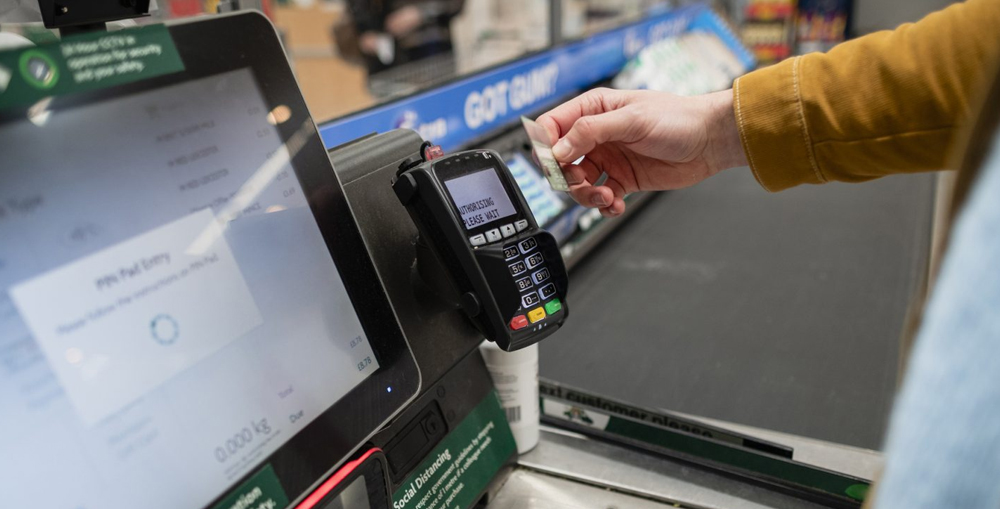
Key Advantages of Retail Self-Checkout Kiosk Machine for Businesses
The Future of Retail Self-Checkout Kiosk Machines
The retail self-checkout kiosk machines are not just used to optimize the customer service, in fact these smart solutions signaling a transformative shift in how customers shop at supermarkets and retail outlets. Since the past few years we have witnessed a huge surge in demand of retail self-checkout kiosk machines in Dubai, Sharjah, Abu Dhabi and other regions of UAE and this trend is not just localized, in fact it is a global trend now and the retail industry is reshaping worldwide with higher adoption of cutting-edge technologies and AI (artificial intelligence) integration. In coming years we will see that the retail self-checkout kiosk will be widely adopted by several industries not just grocery stores or high-end retail outlets.
The small and medium sized businesses are more likely to adopt to these solutions to minimize the cost and to improve the operational efficiency. With the advancement in AI integration and smart sensing technologies we will witness wider utilization of modern technologies such as mobile wallets, scan-and-go type business models and even fully automated AI driven smart retail outlets. This doesn’t mean that the human staff will become obsolete, but in fact it will help businesses assigning the staff more service-oriented roles such as assisting customers choosing the products or managing automated service areas, etc. We will also witness advanced AI (artificial intelligence) and ML (machine learning) enabled discrepancy monitoring and anti-theft tools integrated to retail self-checkout kiosk solutions. In conclusion the future of retail self-checkout kiosk is very bright and promising.
See Also: Emerging Trends in Self-Service Kiosk Technology
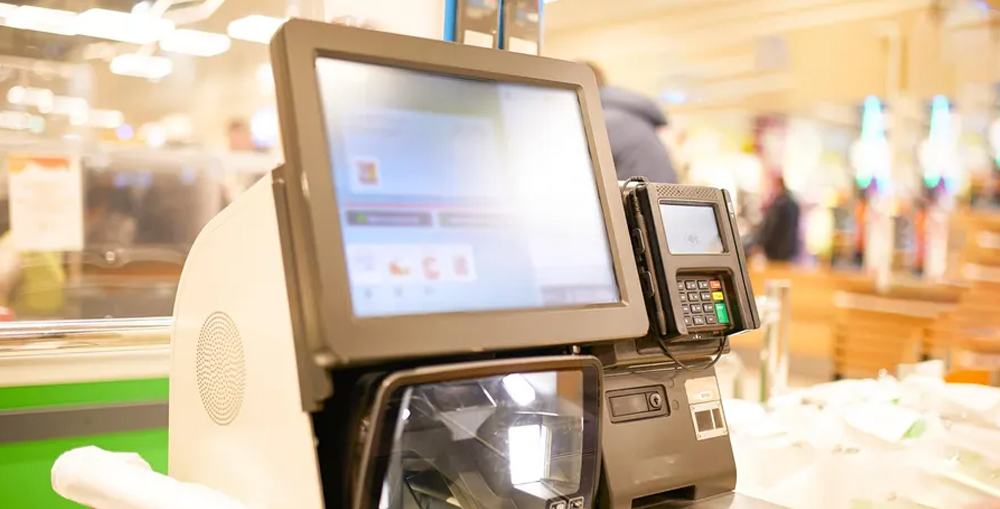
The Future of Retail Self-Checkout Kiosk Machines
Conclusion
The retail industry is always struggling with customer experience and performance management. The retail self-checkout kiosk machines are a revolutionary solution not only helping retail sector dealing with most common challenges but also helping them to boost operational efficiency. These interactive self-service kiosks act as an alternate service channel, offering instant service and elevated customer experience. The retail self-checkout kiosk not just enhance customer experience but it also help improving staff performance by effectively dividing and sharing their workload. These kiosks are designed on cutting-edge technologies which enable businesses to incorporate innovative and creative features to elevate customer experience. Businesses can effectively reduce customer churn and they can collect valuable business intelligence data which helps them take informed and effective decisions.
Businesses are becoming more customer-centric with their ultimate focus on the customer needs. However, catering to customer needs only could have toll on other business aspects. This is what keeps most businesses reluctant in adopting to modern technologies. The retail self-checkout kiosk on the contrary not only improve customer experience, but also enhance staff performance and operational efficiency. These kiosks can operate 24/7 and requires very less maintenance which makes them ideal for all types and sizes of retail setups. The low-cost operation, elevated customer experience and improved staff performance all adds to profitability and growth of the business. In this blog we have briefly discussed what a retail self-checkout kiosk is, how it works and its key advantages for retail businesses. If you want to learn more about the subject or if you want our help to design a customized retail self-checkout kiosk machine for your business, please feel free to contact us through our Contact Us page or leave a comment in the comment box below and we will get in touch with you soon.
